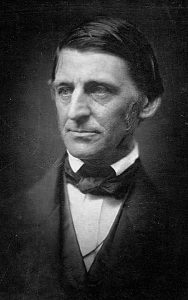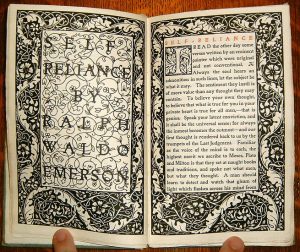
During the nineteenth century, America continued to establish its own identity separate from Europe. Various reforms took place, including prison improvement, abolitionism, women’s rights, and the Second Great Awakening.
America worked to better itself as a nation and overcome any of its shortcomings. As Americans determined the national rhetoric for the budding country, the notion of individualism characterized the climate of change. Individualism, which falls directly under the umbrella of transcendentalism, stressed that we are each responsible for bettering ourselves and our community. Many leaders of this movement emphasized reliance on ourselves and the environment to answer our questions, instead of God, scripture, or previous philosophers. Ralph Waldo Emerson’s writings pushed for these ideals, asserting his belief that humans contain an innate sense of right and wrong independent from religious views. Ultimately, Emerson’s writings became a key player in helping America create its own distinct literary movement during the nineteenth century.
In his first essay, Nature, which was not widely recognized after publication, Emerson presented numerous philosophical concepts and the foundation of transcendentalism. Although his piece could give advice to any American at the time, it specifically spoke to the hearts of other budding American Transcendentalist writers, encouraging them to invent their own style rather than imitating former creators. Emerson’s most famous essay, “Self-Reliance,” consists of journal entries compiled throughout his lifetime as well as excerpts from multiple lectures he delivered. Because Emerson had gained more of a following by the time of this essay’s publication, he targeted this piece toward his general audience of American readers. He sought to nourish confidence in his reader’s ideas and encourage them to try new things, overall pushing America to form a strong self-identity.

Throughout Emerson’s “Self-Reliance,” he continually focuses on the importance of staying true to oneself and discovering originality. The writer encourages his readers to follow their individual will and not conform to social expectations. He also discusses the need for open-mindedness in order to grow as a person, stating that if you are not changing your opinions and learning new information every so often, then you are not advancing yourself as a person. Furthermore, Emerson disputes organized religion in his writing, instead pointing to the idea of experiencing spirituality through living in the present moment. He also discourages the imitation of former great masters of the arts and sciences; he instead believes that greatness is intrinsic, and not something that can be copied. Overall, Emerson argues that reliance upon one’s self frees individuals to uncover their true identity and achieve ultimate independence.
Emerson’s “Self-Reliance” serves to push the individualist agenda of the nineteenth century. When discussing the importance of open-mindedness, Emerson advises that “A foolish consistency is the hobgoblin of little minds, adored by little statesmen and philosophers and divines.” (Emerson 274). Here, Emerson’s emphasis on being open to different perspectives ties in with the individualism ideology. He believes that people often feel they must be consistent for other people, not for themselves. However, the Transcendentalist Movement stresses perfection of self, which encourages one to not care what other people think. Additionally, Emerson demonstrates his objection to organized religion when he speaks of the “purity of the present moment” (Emerson 277). This quote encourages one to find spirituality through your own experiences, and to trust your own beliefs, rather than archaic ideas of the divine. This is a direct opposition to Protestant and other traditional Christian beliefs of the 19th Century, which demanded you must know God through scripture.
Works Cited